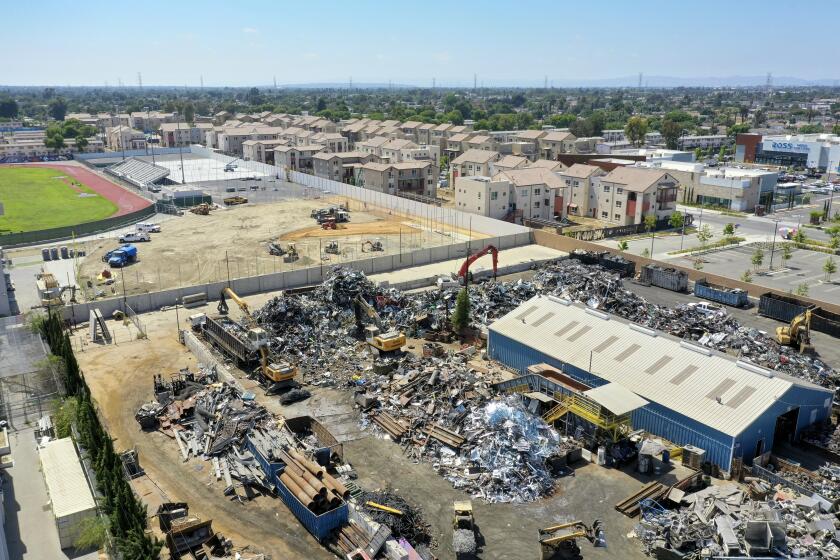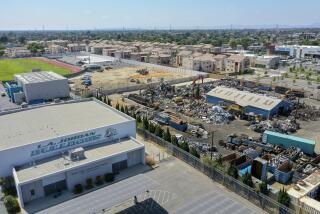Outcry over recycling plant next to Watts high school appears to gain traction
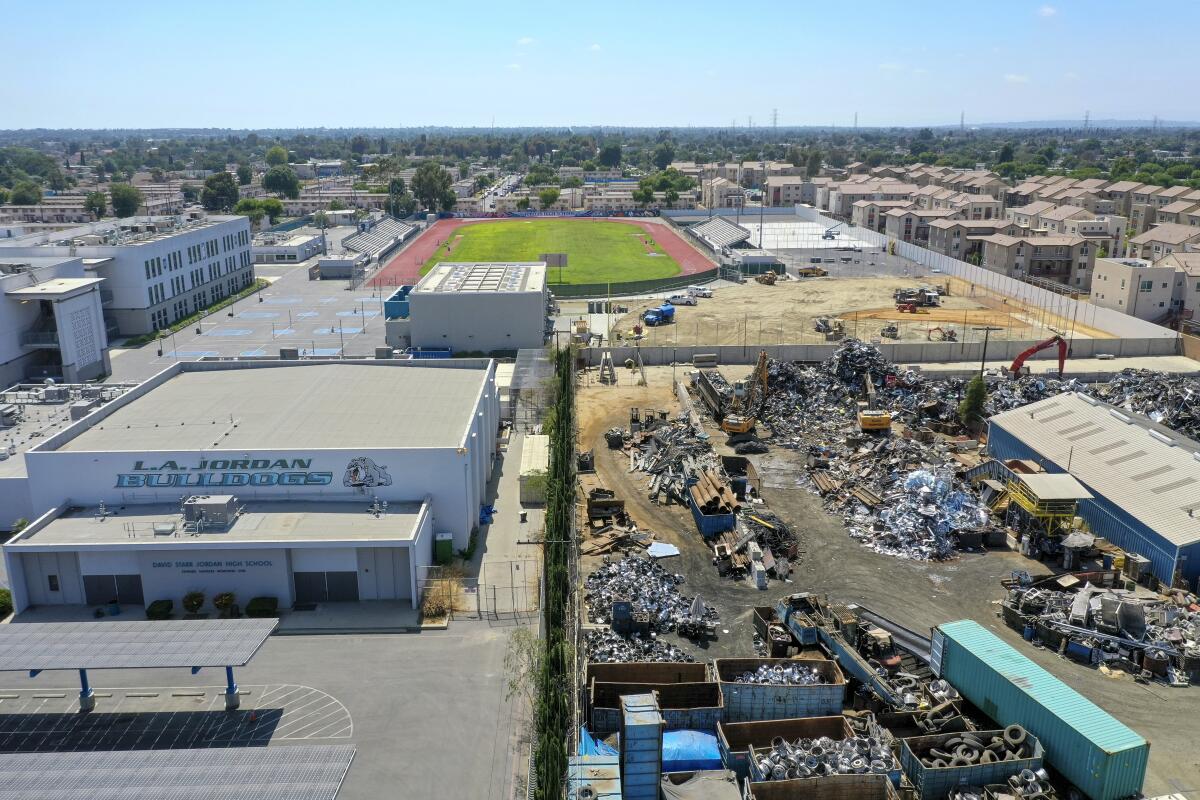
A mediator and attorneys for all parties are projecting a completed settlement by later this year in the legal battle over the Atlas Metals recycling facility, located next to Jordan High School.
During her four years at Jordan High School, Genesis Cruz repeatedly sounded the alarm for fellow students about the metal recycling plant operating next to the historic Watts campus.
At protests at the start of the school year, and again in January, she tried to get them to understand that their situation is far from typical — that most campuses don’t sit adjacent to a place facing allegations that it released sharp pieces of metal, smoke, fumes and other hazards onto school grounds.
“A lot of them … did take the information, and they did read about it,” Genesis said. “But I’m not really sure if it really caught their attention 100% to where they wanted to do something about it.”
But she expressed greater frustration with public officials, who she felt have failed Watts on a major environmental justice issue.

“We’re just used to disappointment,” Genesis said. “No one ever really advocated for us, no one really stood up for us. People in Watts do advocate for themselves, but not many outsiders really consider us and do anything for us, or help us.”
But now, 100 years after Jordan High opened, and nearly 75 years after S&W Atlas Iron & Metal Co. arrived, the rising outrage expressed by students, community groups and others in recent years appears to be gaining traction.
The Los Angeles Unified School District filed a lawsuit against Atlas in 2020, asking a judge to stop the company from “continuing to allow dangerous, sharp metal projectiles, fine metallic dust and other objects to be launched or emitted from their property” onto the Jordan campus.
L.A. school officials are suing S&W Atlas Iron & Metal Co., saying it has released metal projectiles, toxic fumes and metallic dust onto Jordan High School in Watts.
The L.A. city attorney’s office also sued, and the state Department of Toxic Substances Control filed a complaint in L.A. County Superior Court last summer, asking a judge to order the recycling company to obey hazardous waste laws. Also last summer, authorities served Atlas Metals with a warrant as part of an investigation being conducted by the L.A. County district attorney’s office’s Bureau of Investigation.
The legal actions have sparked negotiations involving Atlas, the city attorney’s office and the school district. A mediator and attorneys for all parties are projecting a completed settlement this year, according to court filings, though it is unclear whether that could lead to full shutdown of the facility. In the meantime, the company has retained a consultant to look at its potential buyout valuation.
At one point, metal was piled so high that students and teachers could see it from the campus.
On April 26, U.S. District Judge Stanley Blumenfeld Jr. approved an agreement between Atlas Metals and LAUSD under which the company will reduce the height of its metal piles to a maximum of 10 feet and lower a protective wall made of shipping containers.
“LAUSD and Atlas agree, at least on a temporary basis, the safety wall is an added benefit for the school and should remain in place,” the attorneys wrote.
The firm has also agreed to suspend operations near the boundary between Atlas and the school’s softball field during games.
Attorneys for Atlas Metals noted in court documents that their client and LAUSD are negotiating how the company can potentially transition to becoming a drop yard, which is typically used for long-term storage of trucks and shipping containers.
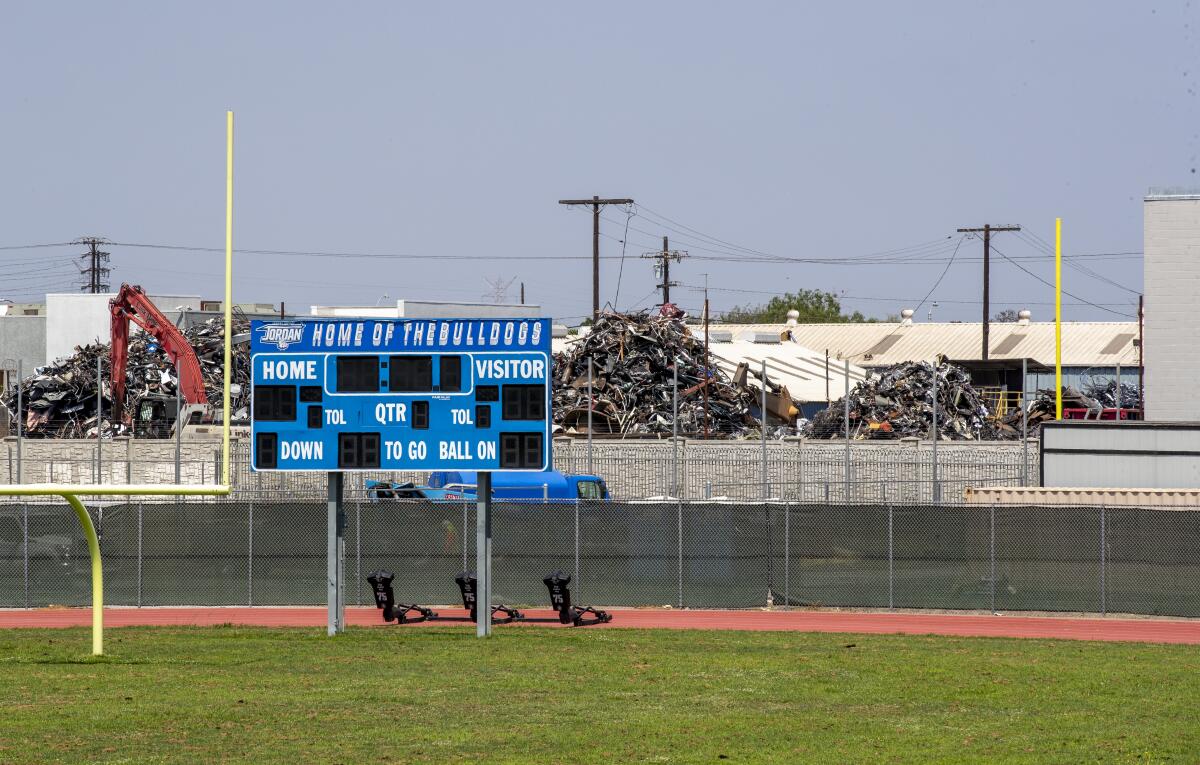
The attorneys said Atlas would need to operate equipment and move scrap materials to make that happen and that “the safety wall will continue to be a beneficial enhanced barrier between the properties.”
Cruz said loud noises have not been as frequent this school year as they were when she first started on campus. The only time she would smell what she described as “dirty oil” was when she walked by Atlas Metals on the way to school.
Matthew Weisenberg, vice president of Atlas Iron & Metal Co. said in a statement that “the ultimate goal at our company is to protect the students at Jordan High School while continuing to provide value to the residents in Watts.”
“This is why we are directly engaged with the school district, working in good faith, to find real solutions to the situation that secures the safety of the students and allows our family business to continue to be a part of our community,” Weisenberg said.
Last week, the Coalition for Healthy Families, a community group focused on removing Atlas Metals from the area, released a letter addressed to President Biden, Gov. Gavin Newsom, Mayor Karen Bass and others calling for more robust action.
“It is time to bring this injustice to an end, and it’s time to inject significant resources into this community and others to right decades of chemical poisoning and neglect,” the letter said.
The coalition called for the immediate shutdown of Atlas Metals, for new state and local laws prohibiting recycling facilities near schools or homes, and for the district attorney to file felony charges against the company.
Latricia Mitchell, president of the Los Angeles branch of the NAACP, also called for officials to close the plant, saying in a statement that “tremendous harm has been allowed to fall squarely on the shoulders of Jordan High School students and nearby residents.”
An L.A. Unified spokesperson said in an email that the school district “doesn’t typically comment on pending or ongoing litigation.” A spokesperson for Dist. Atty. George Gascón’s office said in an email that “the matter remains under review.”
L.A. City Councilmember Tim McOsker, whose district includes Watts, said he supports all discussions between LAUSD and Atlas Metals “to the benefit of the students or the families around the facility.”
If Atlas officials can change how they use their property to “be more consistent with being next to a school, that would be great,” McOsker said. “If they can’t be changed, or modified in ways that are consistent with being next to a school, I would like to see them relocate.”
But some community leaders are skeptical. Part of the problem is “Atlas has not currently been willing to take ownership of the harm they’ve caused,” said Tim Watkins, president and chief executive of the Watts Labor Community Action Coalition.
“What they talk about is remediation, they talk about some kind of appeasement to the community, but they really need to get into the mitigative side of this,” Watkins said. “What is the action that they take that offsets the negative environmental impact that they’ve had for so long?”
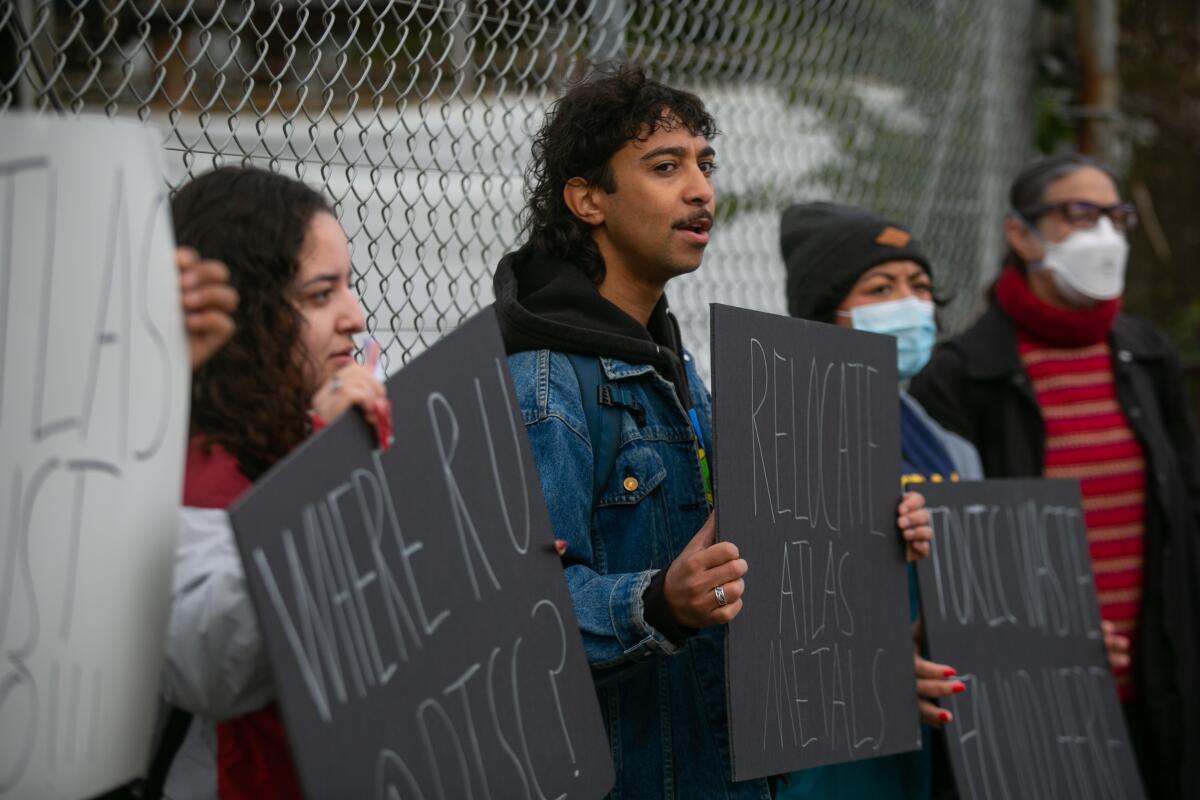
::
Heaven Watson, a Jordan High senior, became more aware of Atlas Metals through her robotics mentor and her participation in the Boys & Girls Club last year.
Watson’s mentor encouraged the students to be aware of what was going on in their neighborhood, including efforts to close Atlas. But Watson had always tried to ignore the noises coming from next door since she knew there wasn’t much she could do.
The Los Angeles district attorney served a search warrant on a metal recycling plant that’s been accused of endangering students at Jordan High School in Watts.
Last summer she and Genesis went on a “toxic tour” of Watts, organized by the Coalition for Healthy Families, that showed federal and local officials around the neighborhood. She and Cruz also told participants about the noises and odors that come from Atlas Metals.
“As soon as you come inside Watts, the first thing you see is trash inside the gutter of our streets or on the sidewalk, and I feel like a lot of people connect Watts just in general with dirt, and just [being] less than,” Watson said.
But she said people in surrounding communities don’t see how unified and committed Watts residents are to improving the neighborhood with community gardens and other initiatives.
Watson plans to attend San Jose State in fall to major in African American studies. Her experience trying to help with the Atlas Metals issue has opened her eyes to the challenges faced by low-income communities and communities of color in prodding officials into action.
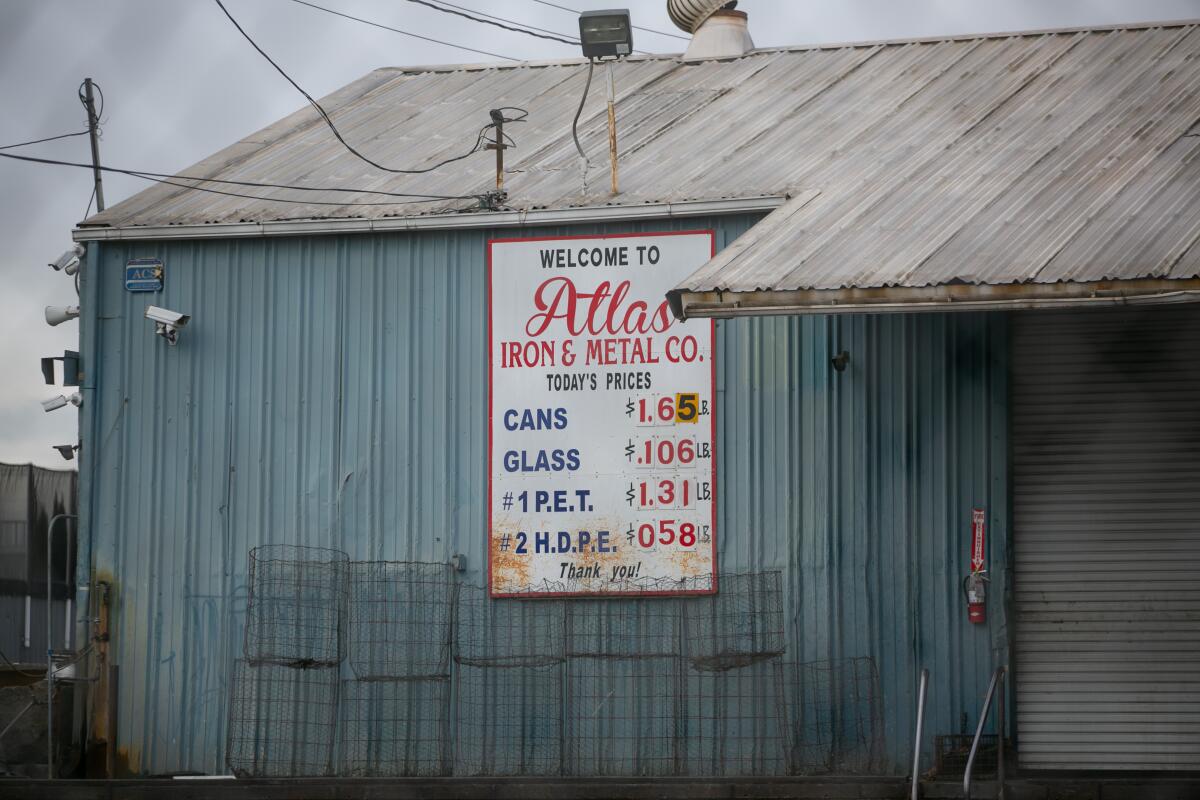
“We are always in this position where we have to go through so many people or everything isn’t being said straightforward, or there’s just things not being told to us,” Watson said. “I would like to be in a position where I can control what goes on in my neighborhood and actually fix it.”
Genesis is looking ahead to graduation, with plans to attend USC and study law, history and culture. Her advocacy work led her to rethink wanting to become a doctor.
“I would say this has really influenced me, and has really changed my vision, and my future career and what I now aspire to be,” Cruz said. “I feel like everything happens for a reason, and I’m just looking at the bright side, so I hope to pursue law and do something for my community.”
More to Read
Sign up for Essential California
The most important California stories and recommendations in your inbox every morning.
You may occasionally receive promotional content from the Los Angeles Times.

